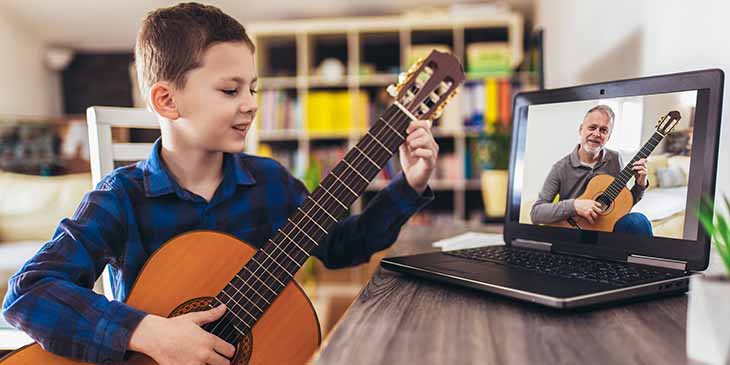Watch our new series of debates on the future of education on YouTube. And if you’d like to get involved in shaping the future of education, join our community on LinkedIn.
This quote (often misattributed to Henry Ford) touches on a central truth about human behaviour: people tend to improve things by building a better version of what already exists. But true innovation sometimes requires real disruption and the removal of something that previously seemed crucial. What does that mean in practice?
A future of education we never imagined
When the pandemic struck, the educational shutdown that followed completely upended the system. Classrooms, timetables, the school day – things that previously seemed essential – were suddenly removed from the equation. Distance learning and hybrid classes became the norm. It’s been just over a year since the shutdown, and the vast majority of students, teachers and parents are keen to return to in-person education. But it does raise the question: if these new educational conditions were in place for a decade, what further challenges and solutions would we discover?
As part of our SHAPE Education initiative, we’re hosting monthly debates with educational experts. The starting point for each discussion are our principles for the future of education. This month we were joined by Maria Cass Zubiria, a professor at the University of Colima in Mexico, and Ralph Tabberer, the owner and chief executive of BBD Education. They discussed how we can learn from the way the educational landscape has changed in the last year in relation to the attainment and wellbeing of learners.
Watch the full debate on our YouTube Channel.
The experimental lockdown primary school
Maria saw first-hand the difference an innovative approach can make to learner wellbeing and attainment. She has two children in primary school, one in fourth grade and the other in sixth grade.
When the schools closed in Mexico, she decided to combine resources with four other families whose children were aged between 6 and 13.
“We created our own tribal school,” she says. “It was like a one-room school – and we got together 10 children and hired two teachers to help them learn.”
The parents decided to remove some of the constraints associated with education in Mexico. They took away uniforms and timetables, alongside the boundaries of age and grade. When it came to the curriculum, they came up with a new education policy of their own. This allows the children to follow their interests, instead of a curriculum.
Reading and storytelling was a big component of the school. Apart from the two main teachers, the parents would also take it in turns to teach the children something once a week.
Students are no longer forced into an education system that doesn’t fit them
Over the course of the following months, Maria noticed some interesting developments. The students were able to follow their interests and learn in a practical way, first-hand. For example, when they were learning about crops, they went to the farm of one of the students’ grandparents. There they learned how crops are harvested.
Despite the fact that they were all different age groups, they were learning well together.
The students would work on the same topic but at different levels. Unlike in a regular classroom, they could help each other learn, working together to build knowledge. Now, the children don’t want to return to formal compulsory education.

“We’ve forced our children to fit into the school system,” Maria says. “But now that they’re away from it they’re actually doing much better.”
And it’s not just anecdotal. There is evidence that this new way of teaching is working and that the learning outcomes are positive.
“The children sit the same exams from the educational system because we need proof of their learning,” says Maria. “But in those exams the children are performing better than their peers.”
New educational solutions
Maria’s approach follows the kind of innovative thinking championed by Ralph Tabberer. “Covid has sort of broken the model of how education works,” he says. “People are experimenting with new models and coming up with fantastic solutions.”
In Ralph’s opinion, the western model of education has been very highly corporatised. He explains that compulsory schools follow a very bureaucratic system. They have a rigid national curriculum that leads towards a standardised exam.
In this system, students are separated by age and ability. They learn at more or less the same pace. The inflexibility of this system can make it difficult to think innovatively. Too often, educators can be blinkered to ideas outside their own model.

“We've had a year and a half of Covid,” Ralph says. “And we've been talking about virtual schooling, but how many people actually looked at the models of virtual schools that already existed around the world?”
Ralph works with academies who have 10–20 years of development in distance learning courses. However, they weren’t approached for their expertise at a time when it could have made a big difference. “People just chose to work within their own echo chamber,” he says, “looking for a variation on the solution which works for them.”
Ralph believes we need to remove the rigid structure of the educational system. “If we can uncouple the bits of our system – in which many pieces are strong – and start to make them available in different combinations to people, the institution or the front line can work in a more flexible way. Then, I think, we're going to get some pretty exciting solutions.”
Learn more
Watch the full discussion between Maria and Ralph in our SHAPE Live event and find out about other past SHAPE Lives.
Read about Cambridge Assessment and Cambridge University Press's outline principles for the future of education, and watch the next debate in the SHAPE Live series:
Learning, Unlearning and Relearning takes place on 15 June. Register your interest on our LinkedIn event listing for reminders.